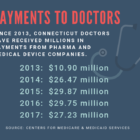I-Team In-Depth
Nursing Homes Prove To Be Ideal Breeding Ground For The Coronavirus Pandemic
|
As cases of COVID-19 surged throughout Connecticut and the nation, “a perfect storm” of circumstances rendered nursing homes unable to handle the crisis, hastening the virus’ spread and deaths, experts say. “It’s just kind of this perfect storm. It’s just the nature of the beast. This is the worst situation for a virus like this,” said Dr. David Hill, professor of medical science and director of global public health at Quinnipiac University Frank H. Netter MD School of Medicine. Indeed, nursing homes care for an extremely frail population, many with underlying health conditions.









